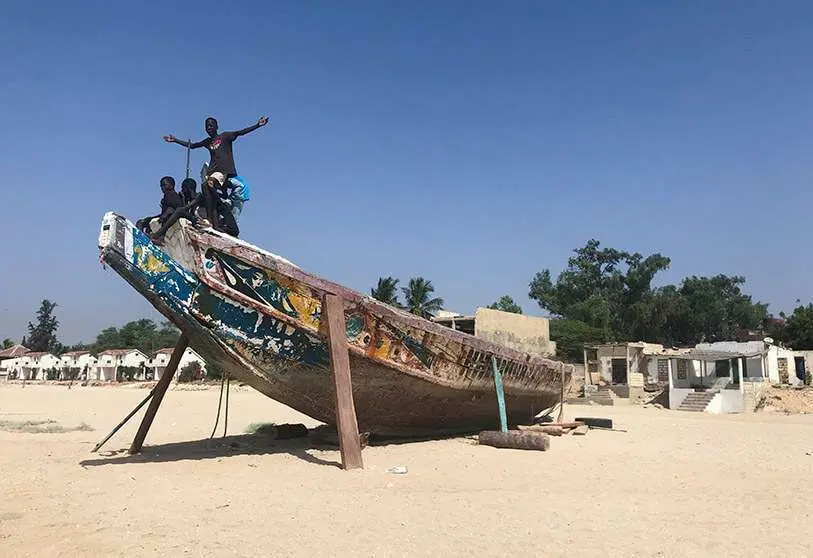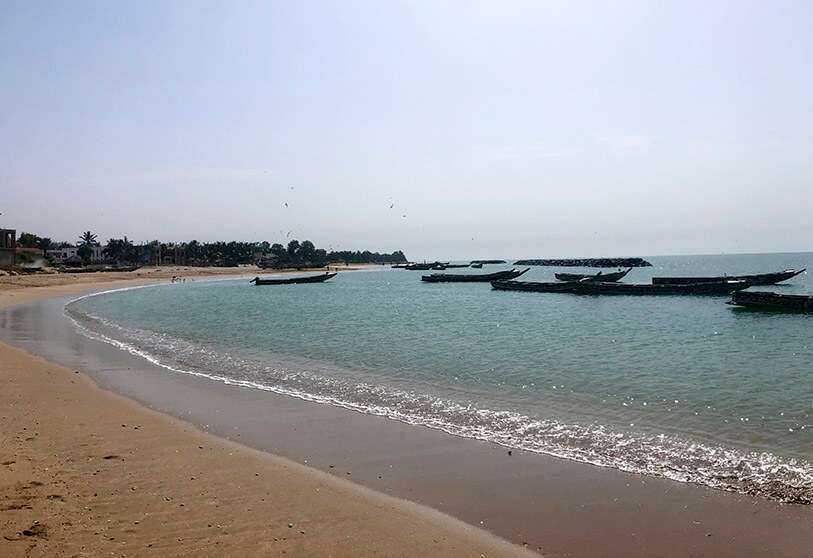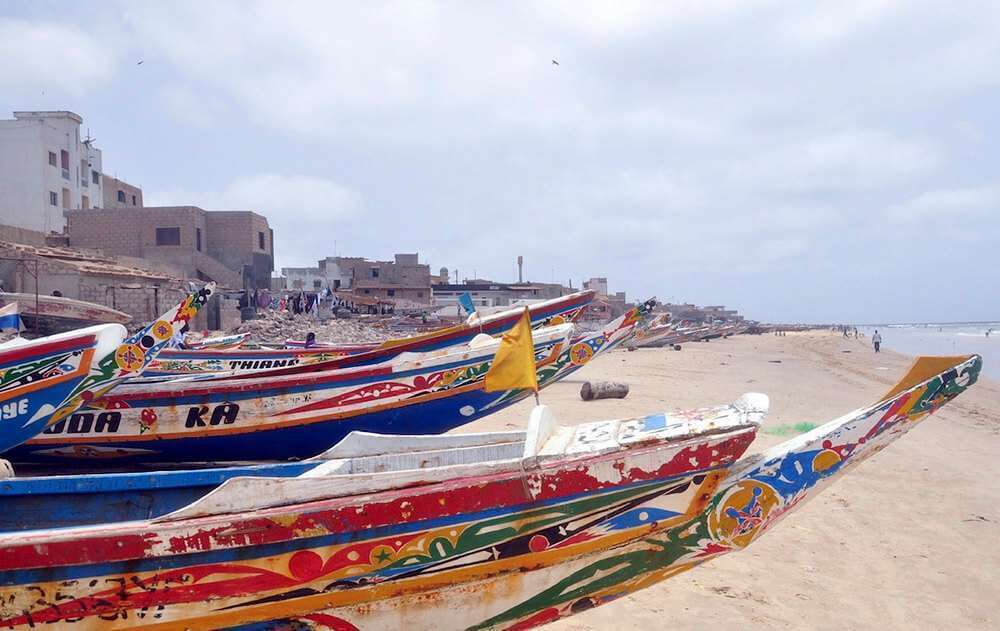The lies of the mafias in Senegal

Many Senegalese risk their lives in vain for the dream of a better future
It is a reality. The mafias manipulate young Senegalese with falsehoods about the pandemic and hoaxes about its regularization in Europe. They tell them - for example - that because of the high number of deaths from COVID-19 in Spain there are now jobs, or that the European Union has ordered massive regularisations of immigrants because of the pandemic. A big lie to attract new passengers from a journey without return and with high doses of danger. The direct consequence is that an army made up of tens of thousands of young people is waiting on the coast for its time to set sail for the Canary Islands.
Humanitarian organisations working in Senegal, such as DIADEM (Diaspora Development Education Migration), have dared to denounce the systematic deception of the traffickers. Badara Ndiaye, president of DIADEM, warns that "the mafias are encouraging young people to take over the jobs of those who have died from the pandemic in Spain and in Europe". In other words, jobs left vacant by the death of a person. "Unfortunately the reality is different. They arrive without opportunities, there are no jobs there either. It's a lost journey because young people don't have information". And worse still, adds Ndiaye, "they have been manipulated".
But the manipulation of the mafias goes beyond this. Moustaphá confesses he is fed up at 20 from seeing how illegal trips are organised that do not come to fruition. He also acknowledges the lies of the traffickers who confuse the younger generations. "There is disinformation circulating in Africa that says that because of the number of deaths caused by the COVID, Europe is regularising illegal immigrants," says this young man from Saint Louis.

Climbing on top of a cayuco on a beach north of Dakar and sailing on a huge tongue of sand, four Senegalese teenagers play at landing while shouting "boza" (which in Wolof language means "land ahoy"). They are no more than 16 years old, but they have a perfect command of the language and the rules of the sea in the hope of one day reaching the "Spanish paradise". They are told that the Canary Islands are the greatest springboard to Europe. What they do not know is that - in many cases - this paradise becomes dark and hostile to newcomers.
In Senegal, with the average age around 18, the perception of the risk they run when they get into a cayuco is low and the illusion of change and - above all - the need to help the family, weighs more heavily. The trips are organised by word of mouth. They are charged between 1,000 and 2,000 euros for a 6-7 day journey on a crowded barge and in subhuman conditions. Senegalese people are well aware that not all those who set sail reach their destination and sometimes they beg the sea for miracles. Moussa is a minor and confesses that his mother and aunts have been preparing him for years to take the final step when the time comes. This young man admits that "he will try it one day and he will do it for his family", although his eyes betray him and he cannot hide his fear.
In Senegal - where the 2006 cayuco crisis is still very much present - anyone knows someone who managed to make it and who automatically became a hero in the eyes of the community. But, in addition, everyone knows the B side of irregular immigration: that of someone who left in search of a better life and unfortunately lost it along the way.
Bringing up the subject, Abbou (a fisherman in Kayar) cannot hide his tears when remembering his compatriots who drowned at sea: "I am moved to talk about it. You see people dying in front of you and you can't do anything to stop them from leaving. "Those who leave have been chosen by the community and it is a privilege for them. There are very few who back out and too many who die," Abbou recalls the last shipwreck that killed nearly 500 young people at the end of October 2020. "It hurts to think how many lives will have to be put at stake to make progress," the fisherman said. It was one of the greatest tragedies in the African country's memory.

In Kayar, a fishing village in the north of the country, thousands of Senegalese feel that the sea is their only hope. Mamadou - who is now a 30-year-old veteran - openly complains about the lack of support from the government. "The EU is plundering our resources and the Senegalese government is doing nothing," he complains. "If they supported us more, and if they gave us the means we needed, we wouldn't have to go to Europe. Mine is a very profitable profession here, and if we cannot carry it out, young people will leave without looking back". He also tells us that although leaving is an individual decision, it is the family and the community that raise the money and encourage them to take the step. "Their journey is a gamble of the people. The chosen ones will be the saviours," says Mamadou.
Ibrahima, who left for Spain during the 2006 cayuco crisis, is well aware of this but decided to return five years later. He left from the beaches of Mbour (in the south of the country) to Tenerife, and from there he made the leap to the peninsula to finally settle in Barcelona. His only option at that time was to make a living as a ''mantero''. And so it was until Ibrahima realised that many of his friends were not doing so badly in Senegal. In fact, they were doing much better than he was. "I risked my life for a dream that wasn't real," he laments. In a couple of years he had radically changed his view of paradise and Spain. He preferred to live with the minimum and close to his people, than to live alone and far from his people. "Returning to my country was a very hard decision, and now here we are much worse off. It is normal for young people to want to run away. There is no way out in this country," Ibrahima adds.
To prevent further deaths and human trafficking, dozens of Spanish National Police and Guardia Civil officers are working alongside the Senegalese authorities in the fight against the mafia and illegal immigration. Their work is key to prevention, but they are also involved in rescue and salvage work at sea. Héctor de la Roz, captain of the Spanish Civil Guard detachment in the port of Dakar, acknowledges that the Senegalese "know full well that not everyone arrives". "We try to avoid this risk, so that they do not put their lives in danger, as well as helping the country's authorities to control irregular immigration," he says. Despite this, immigration to the Canary Islands is still increasing.
The fact is that around 20,000 people have arrived on the islands illegally this year, despite the halt in migratory flows between March and August. The economic impact of the health crisis, the closure of borders, the closed port policy of some European countries, the conflict in the Sahel and the fall in tourism is the perfect storm that has reactivated the Atlantic route and has unleashed an extremely serious situation in the Canaries. Txema Santana, spokesperson for the Spanish Commission for Aid to Refugees in the Canary Islands, is calling for "urgent transfers to mainland Spain in order to relieve the congestion on the islands", with at least 7,000 Senegalese, Mauritanian, Malian and Moroccan immigrants-mainly-who had to be provisionally housed in tourist flats, hotels and military camps. Some already speak of the Canary Islands as the new Lesbos.
Text and photos Diana Rodríguez Pretel









